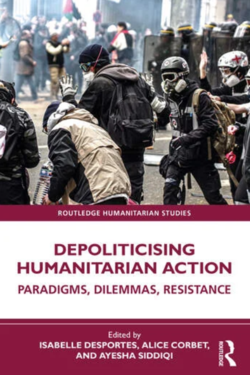Isabelle Desportes | Researcher

Home Institution
:
Centre Marc Bloch
|
Position
:
Postdoc
|
Disciplines
:
Political Science
,
Geography
,
Sociology
|
Biography
Isabelle Desportes is a geographer, postdoctoral researcher at the Centre Marc Bloch and lecturer at the RWTH Aachen. Her research focuses on the (hidden) politics of disaster prevention and humanitarian response, including in authoritarian conflict settings. She co-coordinates the Centre Marc Bloch research focus on ‘Environment, Climate, Energy’ since october 2024.
Her present project, DisasterLobby, is situated at the intersection of critical disaster studies and socio-ecological transformation studies. It approaches disasters as symptoms of our currently unsustainable societies and focuses on how diverse actors draw back on recent fires in Brandenburg (Germany) and close to Bordeaux (France) to advance their interests.
Isabelle obtained her PhD at the International Institute of Social Studies, The Hague, in November 2020. Past academic but also non-academic work stations have been the Disaster Research Unit at the Freie Universität Berlin, the Universities of Amsterdam and Cape Town, the International Federation of the Red Cross Red Crescent in Geneva, the Red Cross Red Crescent Climate Centre in Addis Abeba and the United Nations Development Program in Bratislava.
Researchtopic
Climate Politics; Conflict Studies; Critical Disaster Studies; Environmental Justice; Humanitarian Governance; Urban-Wildland Interface
Title of thesis
Repression Without Resistance: Disaster Responses in Authoritarian Low-Intensity Conflict SettingsSummary of thesis
In my PhD thesis, I investigated how state, civil society and international humanitarian actors engage with the politics of disaster response, and with which implications. My research focused particularly on disasters unfolding in authoritarian low-intensity conflict settings.
My findings suggest that, in such a context, disaster responders engage with the politics of disaster in four major ways:
- The state instrumentalizes disaster response to further political goals in the interests of a few.
- State and non-state disaster response actors fear the politics of disaster response, afraid particularly of being framed as having ulterior political motives.
- Non-state disaster response actors prefer to socially navigate around or conceal politically sensitive issues, rather than to openly confront them.
- There are indications that non-state actors tend to ‘internalize’ a depoliticized approach. Depoliticization efforts do not always come across as being strategically reflected upon.
The thesis identifies the potentially far-reaching implications of depoliticizing disaster response, impacting people’s physical and psychological well-being, social cohesion within and beyond communities, state–aid–society relations and power balances, and the way in which humanitarian operations can be carried out in the future. Systematically depoliticizing disaster response has profound ethical and practical implications; it ultimately constitutes another engagement with politics.
Institution of thesis
Supervisor
Projects
2021-2024: 'TsunamiRisk: Multi-risk assessment and cascade effect analysis in cooperation between Indonesia and Germany - Joint research on tsunamis induced by volcanoes and landslides', coordinated by Prof. Dr. Thomas Walter and funded by the German Ministry of Research (BMBF)
2016-2020: 'When Disaster meets Conflict', coordinated by Prof. Dr. Dorothea Hilhorst and funded by the Dutch Research Council (NWO)
2013: 'Flooding in Cape Town under Climate Risk', coordinated by Prof. Dr. Gina Ziervogel, funded by the United Kingdom Department for International Development (DFID) and Canadian International Development Research Center (IDRC)
DisasterLobby: Socio-political mobilisation following the wildfires close to Berlin and Bordeaux
Depoliticising Humanitarian Action - Paradigms, Dilemmas, Resistance
January 01, 2025Isabelle Desportes , Alice Corbet, Ayesha Siddiqi (Editors)
Edition: Routledge
ISBN: 9781032535098
Is it ever possible to separate humanitarian action from politics? Drawing on the experience of both practitioners and researchers, this book is an essential guide to the thorny interplay between what are too often considered as separate worlds.
The humanitarian sector aims to separate its work from politics, arguing that independence and neutrality are essential in order to gain entry into disaster and conflict settings. Yet, humanitarian claims of non-involvement in politics have also been dismissed as misleading, naive, or counter-productive. In practice, humanitarians find themselves working within political settings on a daily basis. This book investigates the theory behind depoliticisation, the political background and context behind humanitarian action, and the daily dilemmas faced by practitioners walking that fine line between principles and pragmatism. Finally, this book considers the importance of decolonising mainstream understandings of humanitarianism and politics, and of placing understandings from the Global South at the heart of the discussion.
Balancing theoretical insights with empirical grounding, field examples, and recommendations for policy and practice, this book is perfect for researchers and students in humanitarian studies, political science, international relations, human rights, development studies, disaster studies, and peace and conflict studies, as well as humanitarian practitioners and policy makers.
Publications
Book and special issue editorships
- Desportes, I., Corbet, A., Siddiqi, A. (Eds.) (2025). Depoliticising Humanitarian Action – Paradigms, Dilemmas, Resistance. Oxford: Routlege.
- Corbet, A., Desportes, I. (Eds.) (2022). Politique de l’humanitaire, humanitaire politique?Cahiers d’Outre-Mer, 75(286).
Peer-reviewed journal articles
- Wicaksono, W., Desportes, I., Sopaheluwakan, J. (2024). Disaster Cultures and the Indonesia Tsunami Early Warning System: (Mis)Alignments revealed by the 2018 non-tectonic tsunami in Labuan. Australian Journal of Emergency Management 39(1), 34-40.
- Wicaksono, W., Sopaheluwakan, J., Desportes, I. (2023). Optimizing Subnational Warning Mechanisms: Community and Practitioner Perspectives on the 2018 Anak Krakatau-Induced Tsunami in Pandeglang, Indonesia. International Journal of Disaster Management 6(2), 209-226.
- Desportes, I. (2022). Craindre le politique: La réponse humanitaire aux catastrophes dites « naturelles» en Birmanie (2015), Éthiopie (2016) et au Zimbabwe (2016-2019).Cahiers d’Outre-Mer, 75(286), 335-371.
- Corbet, A., Desportes, I. (2022). Introduction au numéro spécial. Politique de l’humanitaire, humanitaire politique?Cahiers d’Outre-Mer, 75 (286), 313-328.
- Desportes, I. and Moyo-Nyoni, N. (2022). Depoliticising disaster response in a politically-saturated context: The case of the 2016-2019 drought responses in Zimbabwe. Disasters, 46(4), 1098-1120.
- Desportes, I. and Hilhorst, D. (2020). Disaster governance in conflict-affected authoritarian contexts: The cases of Ethiopia, Myanmar and Zimbabwe. Politics and Governance, 8(4), 343-354.
- Desportes, I. (2019). Getting relief to marginalised minorities: The response to cyclone Komen in 2015 in Myanmar. International Journal of Humanitarian Action, 4(7), 1-16.
- Desportes, I., Mandefro, H., and Hilhorst, D. (2019). The humanitarian theatre: Drought response during Ethiopia's low-intensity conflict of 2016. The Journal of Modern African Studies, 57(1), 31-59.
- Kuipers, E.H.C., Desportes, I., and Hordijk, M.A. (2019). Of locals and insiders: A ‘localized’ humanitarian response to the 2017 Mocoa mudslide in Colombia?Disaster Prevention and Management, 29(3), 352-364.
- Hilhorst, D., Desportes, I. and de Miliano, C. (2019). Humanitarian governance and resilience building: Ethiopia in comparative perspective. Disasters, 43, S109-S131
- Desportes, I., and Colenbrander, D. (2016). Navigating interests, navigating knowledge: Towards an inclusive set-back delineation along Cape Town’s coastline. Habitat International, 54(2), 124-135.
- Desportes, I., Waddell, J., and Hordijk, M. (2015). Improving flood risk governance through multi -stakeholder collaboration: A case study of Sweet Home informal settlement, Cape Town. South African Geographical Journal, 98(1), 61-83.
Book chapers
- Desportes, I. (in press). ‘Theories of power: Disaster paradigms and what they aim to stifle’. In Principles and Concepts of Disaster Risks, Vol.1., edited by I. Kelman. New York: Springer.
- Desportes, I., Siddiqi, A. and Corbet, A. (2024). Depoliticising humanitarian action: Understanding and countering the status quo in an age of crisis. In Depoliticising Humanitarian Action, edited by I. Desportes, A. Corbet and A. Siddiqi, pp. 1-14. Oxford: Routledge.
- Siddiqi, A., Desportes, I. and Corbet, A. (2024). Conclusion: Alternative visions for humanitarianism. In Depoliticising Humanitarian Action, edited by I. Desportes, A. Corbet and A. Siddiqi, pp. 257-260. Oxford: Routledge.
Blogs and newspaper editorials
- Dittmer, C., Desportes, I. et al. (2022). Katastrophenforschungsstelle zum Bundesweiten Warntag. (blog). Disaster Research Blog – A blog by the DRU. (accessible 7 December 2022).
- Desportes, I. (2020). Disaster response: Why democracy matters. (blog). European Association of Development Institutes Blog – Debating Development Research. (accessible 14 July 2020).
- Desportes, I. (2020). Another top priority in times of crisis: Keep democratic life up and running. (blog). blISS – The ISS Blog on Global Development and Social Justice. (accessible 26 Mar 2020).
- Hilhorst, D. and Desportes, I. (2019). Counter-terrorism laws are undermining humanitarian relief, and are set to get worse today. (blog). Oxfam Blogs. (accessible 12 November 2019).
- Hilhorst, D. and Desportes, I. (2019). De anti-terrorisme wet heeft een lelijk neveneffect. (journal editorial). Trouw. (accessible 12 November 2019).
- van Voorst R. and Desportes, I. (2018). (How) should scholars say what humanitarians can't? (blog). blISS – The ISS Blog on Global Development and Social Justice. (accessible 16 May 2018).
Selected publications for policy and practitioner audiences
Desportes, I., Dalimunthe, S.A., Surtiari, G.A.K. & Reksa, A.F.A. (2024). Applying a “cascading disasters” approach: Warning of non-seismically induced tsunamis in Indonesia. Words into Action Series on the Science-Policy-Society Ecosystem. Geneva: United Nations for Disaster Risk Reduction.
- United Nations for Disaster Risk Reduction [Desportes, I., Dalimunthe, S.A., Surtiari, G.A.K. & Reksa, A.F.A. as contributing members of the reference group] (2024). Words into Action: The Science–Policy–Society ecosystem for disaster risk reduction. Geneva: United Nations for Disaster Risk Reduction.
- Herry Yogaswara, H., Walter, T., Husrin, S. J., Lauterjung, J., Rafliana, I., Desportes, I., Sopaheluwakan, J., Strunz, G. and Spahn, H. (2024). Joint Research between Indonesia and Germany on Volcanic and Landslide induced Tsunamis: Recommendations for the Way Ahead. Zenodo.
- Desportes, I. & Voss, M. (2023). Kurzstudie über die Kommunikation des Auswärtigen Amts und ausgewählter westlicher Geberländer zum Thema humanitärer Hilfe (Bericht nicht öffentlich). Berlin: Akademie der Katastrophenforschungstelle.
- Hilhorst, D., Vervest, M. J., Desportes, I., Melis, S., Mena, R. and van Voorst, R. (2020). Strengthening community resilience in conflict: learnings from the Partners for Resilience programme.ISS Working Papers - General Series, no 666. The Hague: International Institute of Social Studies, Erasmus University Rotterdam.
- Hilhorst, D., Desportes, I., Melis, S., Mena, R., and van Voorst, R. (2020). When Disaster Meets Conflict: A scenario-based approach to the politics of disaster governance in conflict settings. ISS Research brief. The Hague: International Institute of Social Studies, Erasmus University Rotterdam.
- Desportes, I. (2020). Politics of disaster response in authoritarian low-intensity conflict settings. ISS Research brief. The Hague: International Insitute of Social Studies, Erasmus University Rotterdam.
- Hilhorst, D., van Voorst, R., Mena, R., Desportes, I. & Melis, S. (2019). Disaster Response and Humanitarian Aid in Different Conflict Scenarios. Geneva: United Nations International Strategy for Disaster Reduction.
- Desportes, I. (2019). Myanmar: The controversial issue of minorities in responding to cyclone Komen in 2015. ISS Research brief. The Hague: International Institute of Social Studies, Erasmus University Rotterdam.
- Desportes, I. (2019). Ethiopia: Responding to the 2016 drought amid political protest and a state of emergency. ISS Research brief. The Hague: International Institute of Social Studies, Erasmus University Rotterdam.
- Desportes, I. (2015). Partners for Resilience in Ethiopia, Country Case for the Qualitative Process and Impact Study. Groningen: University of Groningen.
Doctoral and Master thesis
- Desportes, I. (2020, November 5). Repression Without Resistance: Disaster Responses in Authoritarian Low-Intensity Conflict Settings. EUR (153 pag.) Ipskamp: The Hague. Prom./coprom.: prof.dr.ir. D.J.M. Hilhorst & dr. R. Van Voorst.
- Desportes, I. (2014, February 7). We’ve got to address the underlying causes. A case-study of stakeholders ́ initiatives to increase resilience to flood risk in Sweet Home informal settlement, Cape Town. University of Amsterdam (114 pag.). Amsterdam. Supervision: dr. M. Hordijk.
